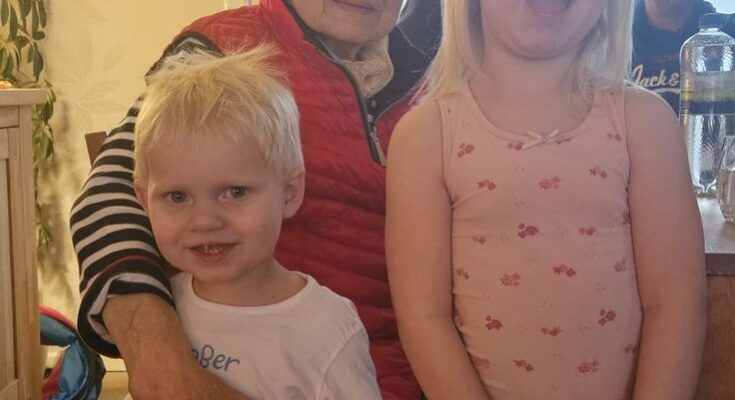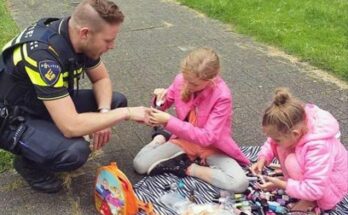At first, it was little things. A last-minute cold. A surprise “plumbing issue.” Once, she even claimed her back “locked up” while making toast. Always some new reason why she couldn’t take the kids for the weekend like we’d planned.
My daughter, Pia, is 7—blonde, chatty, always drawing stuff and leaving glitter in every crevice. My son Kellan just turned 4, and he’s basically a tornado with dimples. They used to spend weekends at my mother-in-law’s place once or twice a month. They loved it. She’d bake with them, spoil them with pancakes, send them back sticky and sleepy. But then, a few months ago, things just… shifted.
I didn’t push it at first. Everyone has off days. But the “off days” became every day we asked.
I brought it up to my husband, and he just shrugged. Said maybe his mom was tired. Or overwhelmed. But she’s retired, super social, and still walks her neighbor’s dog every morning. Overwhelmed? From what?
The weirdest part? She still drops off random little gifts. Coloring books for Pia. A tiny toy tractor for Kellan. A bag of homemade cookies. Always with a sweet note: “Miss you guys! Soon, okay?”
But “soon” never comes.
Last Friday, I asked her point-blank if the kids could come over just for the afternoon. She hesitated, then said, “Maybe next weekend, honey. It’s not a good time right now.”
And before I could even respond, I heard something in the background.
A giggle.
A child’s giggle.
Right then and there, I felt something twist in my stomach. My mother-in-law, Nora, cleared her throat and quickly changed the subject. The call ended as abruptly as it began. I sat there, phone in hand, staring at nothing, replaying that giggle in my head. It definitely wasn’t Pia or Kellan, and I was 99 percent sure it wasn’t the TV or radio. It was an actual, real child’s laugh.
I debated telling my husband about the giggle. We were in the middle of cooking dinner—chicken stir-fry—and I didn’t want to sound paranoid. But the more I thought about it, the more it nagged at me. So I finally blurted, “I think there was a kid at your mom’s house today.”
He gave me a curious look. “Like… maybe her neighbor’s kid came over?” he suggested, tossing broccoli into the pan.
“Maybe,” I allowed, though I didn’t sound convinced. “But I asked if Pia and Kellan could come this weekend, and she wouldn’t commit. Again.”
He frowned, pushing the vegetables around with his spatula. “It’s weird,” he admitted. “But I doubt it’s anything bad.”
I made a noise in my throat and turned my attention back to the salad I was chopping. “I don’t want to assume the worst… but she used to adore having them over.” Then, remembering the unstoppable laughter from the background, I added, “I’m going to talk to her face-to-face. Enough phone calls. I want a real answer.”
The next afternoon, I drove over to Nora’s place alone. Kellan was down for his nap, Pia was distracted by her new coloring book, and my husband was on a Zoom call for work. It was the perfect time for me to slip out.
Nora’s house is a cozy, single-story brick home with flowerbeds lining the walkway. When she answered the door, there was a smudge of flour on her left cheek, and the inside smelled of fresh dough. She broke into a smile, albeit a hesitant one. “Oh, hi, honey. Did we have plans?”
“No,” I said quietly, stepping inside. “I just… wanted to talk.”
Her eyes flickered with something I couldn’t place. Guilt? Nervousness? She swallowed and gestured toward the living room. “Sure, come in.”
I took a seat on her sofa, and she perched on the armchair across from me. There was a mixing bowl on the coffee table, dough half-formed. She must’ve been in the middle of making bread—or maybe pastries.
“I was baking for the church fundraiser,” she volunteered, trying to fill the silence. Then she sighed. “Is this about the kids not coming over lately?”
I nodded, my chest suddenly tight. “Yes. I’m worried. I don’t understand why you keep canceling.” My voice was quiet but firm. “We heard a child’s laugh when I called yesterday. Are you… babysitting for someone else?”
She closed her eyes for a second, her hands twisting in her lap. “I should’ve told you from the start,” she began, swallowing again. “My friend Rosetta—she lives a few blocks away—had an emergency. Her daughter, Candace, is going through a health scare and needed someone to watch her granddaughter, Jori, who’s only five.”
My heartbeat slowed. “So that was Jori’s giggle I heard?”
Nora nodded. “Yes. She’s a sweet kid, but she’s been through a lot. Rosetta’s daughter can’t look after her right now, and Rosetta isn’t in good health herself. So I offered to help, day and night if need be.”
I cocked my head. “Why hide that from us?”
She gripped her hands together so tight her knuckles turned white. “I felt embarrassed,” she admitted, her eyes darting to the floor. “I was worried you’d think I was choosing another child over my own grandchildren. But it’s not that at all. Jori’s situation is complicated. She’s dealing with some serious anxiety and medical checkups. I didn’t want Pia and Kellan to see her having panic attacks or meltdown moments. And I didn’t want the kids to scare her, either—she’s very sensitive.”
I stared at Nora, a wave of relief and empathy washing over me. “So you’re basically fostering Jori for a bit, on and off?” I asked gently.
Nora let out a breath and nodded. “Yes. Just until things get sorted out with her mom. I was trying to spare everyone the drama.” She wrung her hands nervously. “I feel terrible that I made you think something else was going on. I love Pia and Kellan. I just thought this was best.”
I reached over and placed my hand on hers. “Mom, you don’t have to do this alone. We could have helped. You know Pia and Kellan—they’d be so kind to Jori. Sure, they can be loud, but they also have huge hearts.”
Her eyes filled with tears. “I’ve missed them so much, but I was scared. Jori’s had a rough go. She doesn’t trust many people right now.”
“I understand,” I said softly. “But you can trust us. Pia and Kellan might bring her some comfort. Maybe it’ll be good for her to have new friends.”
Nora nodded slowly, tears slipping down her cheeks. We talked for almost an hour—about Jori’s health issues, the tension in Rosetta’s family, and Nora’s desire to protect everyone by keeping them apart. By the time I left, we had a plan: I’d bring the kids over for a short visit on Sunday afternoon, just to meet Jori and see how she felt.
That Sunday morning, Pia was over the moon at the thought of seeing her grandma again. Kellan asked if Grandma would still have pancakes. “Maybe we can do that next time,” I told him with a laugh, hoping we’d have many more visits to come.
When we arrived at Nora’s place, the kids piled out of the car and raced to the door. Nora answered with a big smile on her face—relief plain in her eyes. Behind her, peeking from the kitchen, was Jori: a shy little girl with curly dark hair, clutching a stuffed unicorn. Pia, ever the social butterfly, bounded over and introduced herself with a big grin and an offer to see her new glitter crayons. Kellan just waved and said, “I’m hungry,” which made Jori giggle and relax a little.
Watching them interact, I saw the worry melt from Nora’s posture. We all made small talk, and gradually, Jori came closer, showing Pia her stuffed toy. They were coloring together before long, scribbling hearts and flowers. Kellan was busy with a puzzle Nora had dug out of a closet. The sound of children’s laughter—now three little voices—filled the house with the warmth we’d missed.
Eventually, the kids needed a snack, and Nora served up some homemade banana bread. As they munched, she confessed to me in a low voice, “Thank you for understanding. I didn’t think I could juggle all these emotions. But I see now—it’s so much better when we do this together.”
I patted her shoulder. “We’re family. That’s what we do.”
After a few hours, it was time for us to head out. Pia and Kellan gave Jori hugs goodbye, promising to see her again soon. Jori looked more relaxed than I’d seen her earlier—a little lighter. Nora squeezed my hand and whispered, “Thank you.”
On the drive home, my heart felt full. I thought back to the times I’d fumed over Nora’s cancellations, the times I’d let my imagination run wild, suspecting all sorts of strange reasons. All it took was a real conversation to uncover the truth.
Here’s the thing: Sometimes, the people we love keep secrets not to hurt us, but to protect us—or others. The result can be confusion, misunderstandings, and hurt feelings. But the moment we come together, speak honestly, and trust one another, we can face the challenges side by side. Communication can mend fences faster than suspicion can tear them down.
And that’s the lesson I took away from all this: When we truly care for each other, there’s no need to handle burdens in isolation. We find strength in sharing, in asking for help, and in being honest—even if it feels awkward at first. Because in the end, the warmth of unity outshines the shadows of doubt every single time.
If this story touched you in any way, share it with someone who might need this reminder—and don’t forget to hit “like” to let me know you enjoyed reading!



